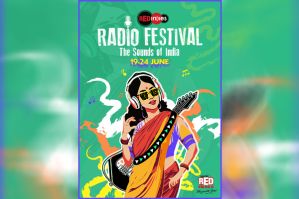Raghu Dixit - "Bands in the UK don't have it as easy as we do back in India"

India's most successful indie act, The Raghu Dixit Project is currently on its biggest international tour yet - and it's well deserved one, for sure. Raghu Dixit has climbed steadily and is known to have played everywhere – from colleges, to festivals, and even for jail inmates.
While the Raghu Dixit Project has already performed at places like South Korea, Japan, Russia, Hong Kong and the UK – this tour is different. The tour is orchestrated by a joint venture between the Jenral Group and Sound Advice agency that signed on Raghu Dixit.
While, Paul Knowles (of the Jenral Group) is now Raghu's international manager, Robert Horsfall of Sound Advice is his lawyer - the two main people who spearheaded this tour.
After the tour kickstarted on 7 May 2010, the band has performed at some of the most prestigious music festivals like WOMAD (Spain), Great Escape (Brighton), and pub performances at The Water Rats (London) - the reviews of the all these international gigs so far have been great, and that certainly puts Indian indie musicians on the world map. But what does it mean to for an Indian band to perform there? And how do people accept an indie musician from India, is probably a question on everyone's mind.
In an email interview, Raghu Dixit gives a lowdown on the tour so far, shares his observations, and on a serious note, suggests the urgent need for Indian bands to be more professional and hard working
Your schedule looks quite impressively packed! How is it being on the road abroad? You are performing almost every alternate day...
This is still not the busiest tour we could be on, so we have a lot of breathing space and some rest between gigs, so it is not extremely hectic. That said, it took some time to get used to the change in weather, schedules etc, but it's been a complete blast!
We have a brilliant crew taking care of us here, so technically everything is in place for us to just go out and play great shows every time. That takes a lot off our minds and keeps us focused on the performance.
You started your tour from WOMAD - how was it? Can you share some experiences/observations? Which has been the most memorable gig so far?
Yes, we started in Spain and I must say each show from there has been memorable in different ways - WOMAD was different because it was in Spain, where we have never played before and where English itself is not spoken widely, so communicating what our songs mean and talking to the people about us and our music was a challenge. However, I do feel that the show we played at the Nehru Center in London was possibly the most important show on this tour because it was a showcase to a lot of big-wigs from the music industry who came back with great reviews.
The last show we did, for the Kannada Association in the UK was very dear to my heart because it was for people from Karnataka and it was like playing back home in India. It was also the longest show we've played here on this tour and we had a great atmosphere with people who already knew our music and were having the time of their lives.
So yeah, each show has been different and important in that sense.
Is performing overseas any different from performing in India for you? Do you have any special repertoire when you're touring abroad? Also, are you also composing any new music on tour?
The performance itself is not different; we put the same energy and enthusiasm into every single show irrespective of where we are and who we are performing to. But that said, there are differences in the way things are done here that makes performing here very different. This time round, we have a tour manager and a tech travelling with us on tour, so our jobs are made easier and we just get to focus on the show itself.
About our repertoire, yes and no, there are small changes to the set depending on who the audience is and what the setting is, for example, we've been playing a few acoustic shows here at the smaller venues and for those shows we change the set list to suit the format. Also, for the Kannada Association gig for example, we played a predominantly Kannada set whereas for the other shows, we stick to a healthy mix of all our songs. Also, since our first album hasn't been promoted much here, we are playing a lot of our old material as well as songs from our new album that is in the making.
Yes, we have composed a lot of songs but they are being arranged on the tour when we get some time to sit together, and then we take it to the stage and try them live and see what kind of a response we get. So yes, the composing never stops!
Considering that a large part of audience would be new to your music, how do you find this audience responding to your music and the unique stage act?
The audience is loving it as far as we can tell! We've been hearing great things and people really liking our music and wanting to do a lot more. We had instances of people hiring a bus and driving all the way from Birmingham to London to come watch us perform, and things like that are really really overwhelming for us. But these are all clear signs that we are on the right path with our music here.
And the stage show is quite a hit as well, we're getting people in the audience to jump along to say, 'Mysore Se Aayi' and then learn and sing some Kannada lines in one of our newer songs 'Lokada Kalaji', right down to tapping their foreheads for one section of the verse! I guess the most interesting gig we've had that way, is at WOMAD where we had a translator who would talk to the audience in Spanish and we'd wait anxiously to see the reaction we expected and get it only after the translator was done!
I believe there must be a lot to learn from the UK indie scene - what impressed you the most? And is there anything that we can adopt for the indie scene back here?
Firstly, that we need to be a lot more hardworking. The bands here don't have it as easy as we do back in India. There we just land up and play, but here bands need to really struggle to book shows and stand out from the crowd and be unique, because there are so many bands looking to play the same venues. Also, right from promoting their gigs to carrying their equipment on to stage and back, everything is up to the bands, a lot of which, bands in India take for granted.
I guess it boils down to professionalism, which is certainly something that bands in India need to come here and experience and then try to imitate that at home.
Send in your comments to: chirag.sutar@indiantelevision.co.in

















